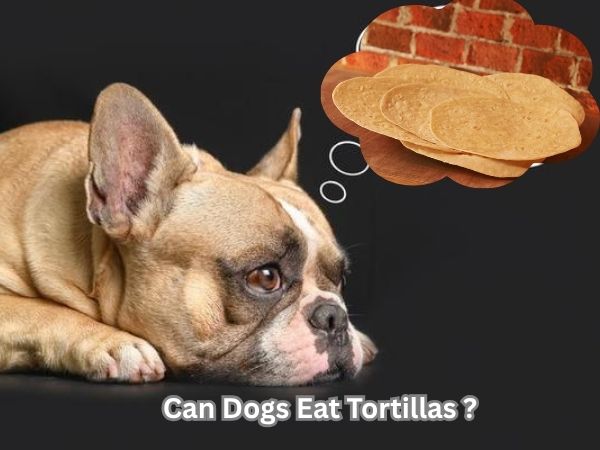Can Dogs Eat Tortillas? 7 Critical Dangers Every Owner Must Know

Tortillas are a quick source of energy, fiber, and minerals for people, especially if they’re made from whole grains or fortified flour. They’re also low in saturated fat when eaten as part of a balanced meal. Corn tortillas provide fiber and magnesium, which help with digestion, heart health, and muscle function. These benefits apply to humans, but it’s important to ask if tortillas are safe for dogs. Can dogs eat tortillas?
Do not give your dog any kind of tortilla until you know the risks. Ingredients and serving sizes that are fine for people can be harmful to dogs. Even plain tortillas may have too much sodium or fat, and flavored or fried versions can be even more dangerous. It’s important to understand these risks before sharing tortillas with your dog.
This article explains seven key dangers of giving tortillas to dogs, when to call a vet, and safer options. Veterinarians and pet experts warn about the sodium and fat in flour tortillas, and the salt and oil in tortilla chips, especially for small or sensitive dogs. Many emergency vet visits are caused by human foods, so it’s important to know the facts before letting your dog have a taste.
Can Dogs Eat Tortillas?
Dogs can have a little bit of plain tortilla now and then. They’re not harmful if your dog grabs a bite, but tortillas don’t really offer anything good for your dog’s health, so it’s best not to give them often.
Are Tortillas Safe for Dogs?
Tortillas aren’t poisonous to dogs, so eating a small piece is usually safe for most healthy pets. If your dog has a gluten sensitivity or wheat allergy, though, skip the flour tortillas since they can cause problems like an upset stomach or itchy skin.
Nutritional Concerns
Tortillas have a lot of carbs, calories, and salt, which aren’t helpful for dogs. Even one tortilla can add more calories than you might expect, and too many can make your dog gain weight. Dogs do best with food that’s high in protein, and tortillas just don’t have what they need.
Can Dogs Eat Flour Tortillas vs Corn Tortillas?
Corn tortillas are slightly better than flour ones because they don’t contain gluten and have fewer calories. They also contain a small amount of fiber and magnesium, which can aid in digestion and bone health. Flour tortillas have more fat and carbs, so they’re not the best choice if you’re watching your dog’s weight.
7 Critical Dangers of Feeding Tortillas to Dogs
A lot of dog owners like to share their food with their pets, but not everything we eat is safe for dogs. Tortillas might look harmless, but they can actually cause health problems for your dog. Knowing about these risks can help you keep your dog healthy.
High Calorie Content and Risk of Obesity
Tortillas have more calories than you might think, and even one can add a lot to your dog’s daily intake. For a small dog, just one flour tortilla can be a significant portion of their daily calories.
Treats should only make up about 10% of your dog’s calories each day, and tortillas can easily go over that limit. If your dog eats them often, they can gain weight and develop health problems like heart issues, sore joints, or diabetes. Tortillas don’t offer any real nutrition for dogs, so they’re basically junk food.
Most dogs don’t need the extra carbs in tortillas. Dogs get all the energy they need from their regular dog food, so adding tortillas just gives them extra calories they don’t need.
Excessive Salt and Risk of Dehydration
Store-bought tortillas usually have a lot of salt, which isn’t good for dogs. Dogs need much less salt than people do, and too much can make them sick.
Excessive salt intake can cause dehydration in dogs, especially if they don’t drink enough water. In really bad cases, salt poisoning can happen, which can cause things like extreme thirst, peeing a lot, or even seizures and kidney problems.
Salt is especially risky for dogs that already have heart or kidney problems. Even healthy dogs can get sick from eating salty foods too often, so it’s best not to give them tortillas.
Harmful Fillings and Additives
Most of us eat tortillas with fillings, and a lot of those can be dangerous for dogs. Things like garlic, onion powder, salsa, and some cheeses are actually toxic for dogs and can make them very sick.
Garlic and onion compounds, even in powder form, can cause hemolytic anemia in dogs by destroying their red blood cells. This condition can be life-threatening and may develop over time with repeated exposure to small amounts. Many flavored tortillas or wraps contain these toxic ingredients without obvious labeling.
Other fillings, such as avocado, spicy salsa, or seasoned meats, can upset your dog’s stomach or even cause allergies. Even cheese can be a problem if your dog is intolerant to dairy or has a sensitive stomach.
Preservatives and Seasonings Toxic to Dogs
Store-bought tortillas often contain preservatives and artificial ingredients to maintain freshness, but these aren’t beneficial for your dog and can actually harm their health.
Xylitol, an artificial sweetener sometimes found in processed foods, is extremely toxic to dogs and can cause rapid drops in blood sugar, seizures, liver failure, and death. While not commonly found in tortillas, it’s essential to carefully check ingredient labels.
Many tortillas contain artificial colors, flavors, and preservatives that can be harmful to your dog over time. Spices like chili powder or paprika can also upset your dog’s stomach.
Gluten Allergies and Intolerances in Dogs
Flour tortillas contain gluten, which can cause issues for dogs that are sensitive to it. Gluten allergies aren’t super common in dogs, but they do happen and can make your dog uncomfortable.
If your dog is intolerant to gluten, you may notice symptoms such as itchy skin, ear infections, upset stomach, or even weight loss. Some dogs also get skin problems or throw up after eating gluten.
Some breeds, like Scottish Terriers, Great Danes, and Irish Setters, often have sensitive stomachs and don’t do well with grains. If your dog is sensitive to gluten, even a little bit of tortilla can make them feel bad for days.
Choking Hazard from Large Pieces
Tortillas can be a choking hazard, especially if you give your dog big pieces. The size and texture can get stuck in their throat and cause a scary emergency.
Small dogs are even more at risk for choking on people’s food. Broken tortilla pieces can have sharp edges that hurt your dog’s mouth or throat, and the chewy texture can form a ball that’s hard to swallow.
Dogs usually eat quickly and don’t chew thoroughly, so large pieces can get stuck easily. Any food that doesn’t break up well can be a choking risk for dogs.
Possible Upset Stomach Including Vomiting and Diarrhea
Tortillas contain a high amount of carbs, unusual ingredients, and chemicals that can upset your dog’s stomach. Many dogs experience gas, vomiting, or diarrhea after eating tortillas, especially if they consume a large amount.
Dogs aren’t built to handle the processed flours and additives in tortillas. All those carbs can mess with their digestion and cause gas or bloating.
Even dogs that aren’t sensitive to food can get stomach problems from tortillas because they’re so processed. These issues can show up a few hours after eating and last a day or two.
Can Dogs Eat Tortilla Chips?
Tortilla chips aren’t a good snack for dogs, but if your pup grabs one or two by accident, it’s usually nothing to worry about. Still, these crunchy chips have stuff in them that isn’t great for your dog’s health.
High Salt Content
Tortilla chips have a lot more salt than dogs need. Too much salt can cause problems for your pup, like:
- Excessive thirst and urination
- Vomiting and diarrhea
- Dehydration and electrolyte imbalances
- In severe cases, sodium poisoning with tremors and seizures
Unhealthy Fats
Tortilla chips are fried in oil, so they’re really high in fat. Eating too much fat can cause:
- Weight gain and obesity
- Pancreatitis (a painful inflammation of the pancreas)
- Digestive upset
Safety Risks
The sharp edges of tortilla chips can hurt your dog’s mouth or throat, and they can even be a choking risk, especially for little dogs.
What If My Dog Ate Some?
If your dog grabs a chip or two, try not to worry. Just keep an eye out for things like vomiting, diarrhea, or drinking a lot of water. If your dog eats a lot of chips or seems unwell, it’s a good idea to call your vet.
Better Alternatives
If you want to give your dog something crunchy, here are some safer options:
- Carrot or apple slices
- Homemade baked sweet potato chips
- Plain rice cakes (unsalted)
Your dog will be happier and healthier with treats made just for dogs.
5 Risks of Feeding Flour Tortillas to Dogs
Flour tortillas might look harmless, but they can cause a few health problems for dogs that are good to know about.
1.Gluten Sensitivity and Allergic Reactions
Some dogs can’t handle gluten or wheat, so flour tortillas can be a problem for them. If your dog is sensitive, they might have symptoms like:
- Recurring skin infections and hotspots
- Persistent ear infections
- Excessive itching and irritation
- Digestive upset with vomiting or diarrhea
Grain allergies in dogs are usually mild, but they can still make your dog uncomfortable.
2.Excessive Calorie and Carbohydrate Content
Flour tortillas have more calories than you might think, and they don’t give your dog any real nutrition. Too many can lead to weight gain, since treats should only be a small part of your dog’s diet. All those extra carbs aren’t needed and can cause health problems if your dog eats them often.
3.High Sodium Levels
Flour tortillas often have a lot of salt, which isn’t good for dogs. Too much salt can upset your dog’s stomach or even cause dehydration, especially if they don’t drink enough water. Dogs don’t handle salt the same way people do, so even a little extra can be a problem.
4.Dangerous Additives and Preservatives
Store-bought flour tortillas can have additives and preservatives that aren’t meant for dogs. Some even have things like garlic, which is dangerous for them. These extras can upset your dog’s stomach and don’t offer any benefits.
5.Harmful Fillings and Toppings
Tortillas are usually filled with things like cheese, salsa, or spicy sauces. Some of these, like onions and garlic, are actually toxic to dogs. Even fillings that seem safe can add extra calories and salt your dog doesn’t need.
It’s better to give your dog safe treats like plain chicken, carrots, or dog snacks made just for them. These have real nutrition and are much better for your pup.
Are Homemade Tortillas Better for Dogs?
A lot of dog owners wonder if homemade tortillas are safer for dogs. While they might be a little better than store-bought ones, they’re still not a great treat for your pup.
Homemade Might Be Better
Control Over Ingredients
If you make tortillas at home, you can choose what goes in them. Store-bought ones often have preservatives, too much salt, and other things that can upset your dog’s stomach. Homemade tortillas let you avoid those extras.
Less Sodium and Fat
Store-bought tortillas usually have a lot of salt and unhealthy fats. If you make them yourself, you can use less salt and better oils, which is easier on your dog’s stomach.
The Reality Check
Still Not Nutritious
Even homemade tortillas don’t really give your dog any nutrition. They’re just extra calories that can lead to weight gain if you give them too often. Treats should only be a small part of your dog’s diet.
Potential Issues Remain
- High carbohydrates can lead to weight gain over time.
- Wheat allergies may still be triggered by flour tortillas.
- Corn sensitivities can cause digestive upset in some dogs.
Safe Sharing Tips
If you decide to share a homemade tortilla with your dog, follow these guidelines:
- Only offer plain, unseasoned tortillas without garlic, onion, or spices.
- Give tiny pieces as an occasional treat, not a regular one.
- Choose corn tortillas over flour if your dog has gluten sensitivity.
- Always supervise your pet and watch for any digestive upset.
Homemade tortillas might be a little safer than store-bought, but they’re still not the best treat for dogs. Healthier options like carrots or apple slices are better for your pup.
What to Do If Your Dog Eats a Tortilla
If your dog grabs a plain tortilla, try not to worry. Most dogs can handle a small piece without any trouble, even though tortillas don’t have any real benefits and are high in carbs your dog doesn’t need. Here are some things to watch for and when to call your vet.
Signs of Distress to Watch For
Watch your dog for a day or two after they eat a tortilla. Look out for these signs:
- Vomiting or diarrhea that persists beyond a few hours, which could signal an upset stomach from the carb overload
- Loss of appetite or refusing to eat their regular meals
- Lethargy or depression, where your dog seems unusually tired or uninterested in activities
- Abdominal pain is shown through a hunched posture or discomfort when you touch their belly.
- Excessive gas or bloating from difficulty digesting the flour or corn
When to Contact a Vet
Most cases resolve on their own, but certain situations need professional attention. Contact your veterinarian immediately if you notice:
- Vomiting or diarrhea lasting more than 24 hours, as this can quickly lead to dangerous dehydration
- Blood in vomit or stool, especially dark red or black blood
- Signs of dehydration, like sunken eyes or skin that doesn’t bounce back when gently lifted
- Severe lethargy combined with digestive upset
- Known toxic ingredients include garlic, onion, or xylitol, which are poisonous to dogs
Puppies and older dogs can get sick more easily, so take them to the vet sooner if you notice any symptoms.
Healthier Alternatives to Tortillas for Dogs
If you want better treats than tortillas, there are lots of safe and healthy options your dog will enjoy, without all the extra salt or calories.
Safe and Nutritious Human Food Treats
Instead of giving your dog tortillas, try some of these healthy snacks you might already have at home:
- Lean proteins: Cooked chicken, turkey, or fish (boneless and unseasoned) are excellent protein sources that support muscle health
- Fresh vegetables: Carrots, green beans, and cooked sweet potatoes provide vitamins and fiber without excess calories
- Fruits: Apple slices (no seeds), blueberries, watermelon, and bananas offer natural sweetness and nutrients
- Cooked pumpkin: Plain pumpkin puree (not pie filling) aids digestion and makes a tasty treat
- Plain yogurt or cottage cheese: These provide calcium and probiotics in small amounts
- Peanut butter: Choose xylitol-free varieties and use sparingly as a special reward
Dog-Specific Healthy Treats
For convenience and balanced nutrition, quality dog treats are formulated specifically for canine needs:
- Training treats: Low-calorie options like Full Moon Organic Chicken or Hill’s Natural Training Treats work perfectly for frequent rewards
- Single-ingredient treats: Freeze-dried proteins or turkey meatballs provide pure nutrition without fillers
- Grain-free options: Charlee Bear treats suit dogs with sensitivities while keeping calories low
These treats will make your dog happy and help keep them healthy, too.
Conclusion
Tortillas won’t poison your dog, but they’re not a healthy treat. They’re just empty calories and can cause weight gain or stomach problems if your dog eats them often. A tiny piece once in a while is probably fine, but don’t make it a habit.
What Makes Tortillas Risky?
Tortillas aren’t poisonous, but here are some reasons they’re not good for dogs:
- High in carbohydrates with minimal nutritional value for canine health
- contains excess sodium that can cause stomach upset and dehydration.
- Often include preservatives and additives that may be harmful to dogs.
- Seasoned varieties may contain potentially hazardous ingredients, such as garlic or onion powder.
Always Check With Your Vet First
Before giving your dog any people food, it’s a good idea to check with your veterinarian. Every dog is different, and what works for one might not be safe for another. Your veterinarian can help you determine what’s best for your pup.
FAQ
Can dogs eat corn tortillas or flour tortillas?
Dogs should not eat corn or flour tortillas. Both contain carbs, salt, and sometimes oils that are hard for dogs to digest. While a tiny bite may not harm, regular feeding can cause weight gain, stomach upset, or long-term health issues.
Are tortillas safe in small amounts?
A very small piece of plain tortilla is usually not toxic, but it offers no nutrition for dogs. Even small amounts can cause digestive problems in sensitive dogs. It’s always safer to stick to dog-friendly treats instead of human foods like tortillas.
What are the symptoms of tortilla intolerance in dogs?
If a dog cannot handle tortillas, symptoms may include gas, bloating, diarrhea, vomiting, and itchy skin. Some dogs may also show signs of tiredness or stomach pain. If these issues appear after eating tortillas, it’s best to avoid them in the future.
How can I treat a dog that ate too many tortillas?
If your dog ate too many tortillas, watch for stomach upset, vomiting, or diarrhea. Offer fresh water, skip the next meal, and monitor closely. If symptoms are severe or last more than a day, call your vet right away for advice.
What are healthier alternatives to tortillas for dogs?
Instead of tortillas, give your dog safe snacks like plain rice cakes, cucumber slices, apple pieces (without seeds), or dog-friendly biscuits. These options are lighter on their stomach and provide more nutrients without the risks linked to tortillas.



